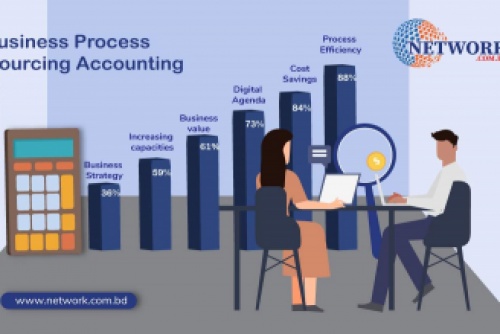What Is The Impact Of BPO Outsourcing On Your Company?
Contracting a certain work procedure to an external service provider is known as business process outsourcing (BPO). Payroll, bookkeeping, telemarketing, data acquisition, online marketing, customer service, and other services are examples of what can be provided.
Growth of BPO Industry: The worldwide BPO market was valued at $245.9 billion in 2021, and it is expected to expand at a 9.1% compound annual growth rate from 2022 to 2030, reaching $525.2 billion.
Based on the vendor's location, the BPO industry is classified into three categories:
Offshore vendors are based in countries other than the company's own. A US corporation, for example, might hire a Philippines-based offshore BPO vendor.
Nearshore vendors are based in countries that are close to the contracting company. A BPO in Mexico, for example, is regarded as a nearshore vendor in the United States.
Onshore vendors are located in the same nation as the client, but may be in a different state or city. A corporation in Seattle, Washington, for example, could choose an onshore outsourcing supplier based in Seattle or Huntsville, Alabama.
Key Elements:
Business process outsourcing enlists the help of third-party suppliers or subcontractors to do particular tasks.
Business outsourcing started with large industrial organizations to help with supply chain, but it has now expanded to include a wide range of industries, including services.
If the supplier or subcontractor is based in a separate nation, such as in customer service, Business process outsourcing is considered "offshore outsourcing.
Business Outsourcing Services Example
In 2021, a B2B research firm polled 500 small-business managers and owners and discovered that eight out of ten of them want to outsource business processes. This is how it breaks down:
According to the study, The highest usability of Business Process Outsourcing (BPO) in the IT service with 27% all over the world. On the other hand, Finance and accounting sectors are in the second position with 23% among business process outsourcing users. Approximately 20% of legal work and digital marketing sectors also hire bpo outsourcing companies. Unfortunately, HR departments are a little bit slow in this race.
What Services Can BPO Outsourcing Companies Provide?
Information Technology-Enabled Services (ITES): This type of BPO uses information technology (IT) to deliver services over the internet or a data network.
Knowledge Process Outsourcing (KPO): BPO has been altered by KPO. Some KPO suppliers support activities that are deemed important in the business advisory world, even if they aren't core in the company that hires them.
Legal Process Outsourcing (LPO): LPO is a subgroup of KPO that covers a wide range of greater legal activities, not just legal transcribing.
Research Process Outsourcing (RPO): RPO is a subset of KPO that focuses on research and analysis. RPO firms serve corporate, investment, biotechnology, and marketing firms by conducting research and analysis.
BPO Outsourcing Companies: Pros Vs. Cons
Pros
Because the labor has been trained and specialized in specific areas, they are not required to multitask.
Saves the outsourcing company money on technology and infrastructure, as well as staffing and training costs.
BPO firms can swiftly acquire access to the proper resources - technological or otherwise - to help your company grow and meet shifting business demands.
Cons
Workers are not as available as those who work in-house, making it difficult to keep a high standard of satisfaction.
If the third party is understaffed or managed, or is not the perfect fit for the organization, the cost reductions may not be as significant as initially anticipated.
Companies without a solid information security policy may experience data theft or information security breaches.
Important: BPO industry is increasing, as indicated by the fact that the global market for outsourced services was valued at 88.9 billion dollars in 2017, up $12 billion from previous year.
What Advantages Does Business Outsourcing Provide?
We discovered that firms want the following features from BPO outsourcing companies in our 2021 report:
Features
Percentages
Standardization and process efficiency
88%
Cost savings
84%
Accelerating the digital agenda
61%
Increasing capacities
59%
Driving business value
73%
Business strategy in general
36%
Future Of Business Process Outsourcing Services
BPO industry's future, like that of many other businesses, will be shaped by automation. Many analysts believe RPA will be the primary means by which the BPO industry will evolve. Data entry and image recognition, for example, are simple to automate. Certain jobs, such as written data and advertising, are expected to resist automation, according to experts.
To save costs and drive growth, all businesses, especially the BPO industry, will likely use developing technologies like cloud storage, social networks, and machine learning. The productized service is a business method that incorporates technology and an outsourced employee.
Final Thoughts
Outsourcing should be included in a business's planning process. Outsourcing may have lengthy value for both businesses and the clients they serve when used for the appropriate reasons and also with the right third-party vendor. If you are searching for a business outsourcing service in Bangladesh then visit this site.
















